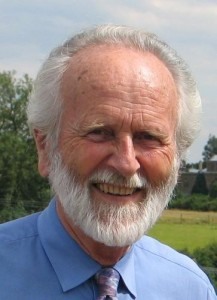 We often sing Fred Kaan’s hymns on Sundays. There are a dozen of them in Singing the Faith; I rather think they are sung more often than their mere number might suggest, perhaps because he addresses the problems and concerns of the modern world in away which resonates with congregations today. His skill in contemporary hymn writing has served too as a stimulus for a new generation of hymnwriters like Brian Wren, Graham Maule and Fred Pratt Green.
We often sing Fred Kaan’s hymns on Sundays. There are a dozen of them in Singing the Faith; I rather think they are sung more often than their mere number might suggest, perhaps because he addresses the problems and concerns of the modern world in away which resonates with congregations today. His skill in contemporary hymn writing has served too as a stimulus for a new generation of hymnwriters like Brian Wren, Graham Maule and Fred Pratt Green.
Fred’s life and beliefs were much influenced by his younger days. He was born in Holland in 1929 and in his teenage years he lived through the brutality of the Nazi occupation. His parents were committed anti-Nazis and members of the Dutch resistance. They hid guns under the floor and gave shelter to fugitives. Three of his grandparents died of starvation.
Until his mid teens Fred never set foot in a church. But as he recalled "Emerging from the war a committed pacifist, I became interested in the faith and began the study of theology and psychology at Utrecht University". Friendship with an English Congregationalist led him to come to Britain where he enrolled at theological college and was ordained to the Congregational ministry in 1955. He acquired complete mastery of the English language which in effect became his first language. He served as pastor in several churches before moving to Geneva as minister-secretary of the International Congregational Council, in which capacity he travelled the world for ten years. He returned to the UK as moderator of the West Midlands province of the URC during which time he preached at this church, as several will recall. Ultimately he retired to the Lake District where he died in 2009.
He was a person of wide sympathies, warmth and somewhat cheeky humour. He was a tireless campaigner for peace, justice and human rights. Finding the hymn books of the time lacking hymns which reflected the sentiments of postwar Britain or the key message of the New Testament as he read it, he started to write his own hymns to accompany his sermons. These were hymns of real substance, mostly set to well established tunes – he dismissed the increasingly fashionable worship songs as mere “nursery rhymes”. A small volume of his hymns was published at first and soon finding wide circulation, others followed. He became a prolific writer, producing several hundred hymns during his lifetime. His legacy is perhaps best expressed in his hymn:
For the healing of the nations,
Lord we pray with one accord
for a just and equal sharing
of the things that earth affords
To a life of love in action
Help us rise and pledge our word (STF 696)
David Tidy
